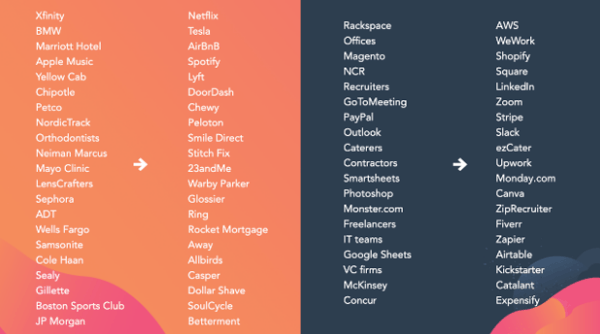Early September saw the annual Inbound conference in Boston, MA, and with our very own Eric Swain in attendance, the Equinet office is now teaming with new insights, ideas and observations.
There were two particular stand out keynotes from Hubspot Co-founders Brian Halligan and Dharmesh Shah.
Brian focused on the experience disruptors of the moment, using a few familiar names to illustrate his point: Netflix, Spotify, Slack, for example.
What exactly does Brian mean when he talks about an 'experience disruptor'?
We're probably more familiar with the term 'disruptor' within the technology industry: technology disruptors and digital disruptors.
The innovators.
The ones who are shaking things up with new ideas and products.
But Hubspot refers to experience disruptors as 'a new breed of growth leaders'.
These companies are disrupting the marketplace and challenging the status quo. They recognise that consumer behaviour and expectations are changing, and with that, incumbents are getting left behind. So, they focus on creating the best customer experience possible through personalisation, ease of purchase, and delivering more value to their customers.
They are measuring the experience, not just the product.
But it's not just a better experience they're delivering, they're disrupting the very notion of what customers should be able to expect from companies.
So what is it they’re doing so differently that enables them to overrun their incumbents and dominate their markets?
You might well recognise some more of them when we put them alongside those incumbents:

Image source: Hubspot
The interesting thing about these disruptors is that they sit at the top of a 'winner takes all' kind of market.
While we all have competitors, these guys tend to dominate their industries and take the largest proportion of the market.
Why is this?
What is it they're doing so differently?
Halligan puts it down to 5 genetic adaptions.
Genetic adaption 1: They are 'experience-market' fit
Disruptors focus on the experience market because they recognise that people don't want to be SOLD to anymore, but they're attracted to the experience of a product.
They create delightful and meaningful customer experiences that remove pain, create meaningful relationships and make it easy to do business with them.
Carvana, for example, has created a car ‘vending machine’. They have shaken up the car-buying experience by challenging the status quo. Because guess what?
People aren’t so keen on being sold to by car salesmen anymore.
Through Carvana they can choose a car, choose what time they want it delivered, no paperwork, they try the car out and within it a week if they're not happy, they can return it - no questions asked.
Carvana has taken the experience of buying a car and enhanced it. Of course, they still have great products but they have even better experiences.
Genetic adaptation 2: They remove friction
These disruptors don’t follow conventional wisdom. Instead, they think about how they can add value to their customers rather than extract value from them.
Atlassian for example, sell thousands of dollars of software online, with no sales rep, no middle man, and yeah you got it, no friction.
As the president of Atlassian puts it: "Software should be bought, not sold."
Most notably, Brian identified one key similarity between B2B experience disruptors - they all adopted a B2C marketing strategy. Atlassian have no sales reps and no discounts. But the experience is frictionless.
Genetic adaptation 3: They personalise
Companies like Spotify and Netflix use their data so that the more you use the product, the more personalised the experience gets.
But beware - with big data comes big power, and with big power comes big responsibility. Have you ever had an innocuous conversation about something only for an ad to interrupt your social media scrolling a few moments later? Intrusive and overbearing adverts only tend to freak people out or irritate. Be responsible.
Disruptors are going beyond psychographics and personas and using data like never before. Experiences with products are more personalised than ever and we are being presented with content produced with us in mind.
Buyer personas of course, have their place. But can you go one step further?
Genetic adaption 4: They sell through their customers rather than to
Emily Weiss of Glossier is a prime example of an experience disruptor. She’s an extraordinary content creator herself but she enables her customers to create their own content too. She uses her products to create experiences her customers will love and sells through her customers rather than to them.
There are thousands and thousands of pieces of content across the web, including social media platforms like Instagram and Youtube, promoting her products. Some of those content pieces have millions of views. Like Brian says: “How they sell is WHY they win.”
Genetic adaptation 5: They attack the business model
You will always have competitors no matter who you are. But what about the market leaders that dominate their industries? When you really dissect their business models, you’ll notice they are the business model BUSTERS. They challenge the conventions, they do different and they’re not afraid to take risks.
How are they disrupting? They’ve challenged the status quo, they think differently and they put their customers at the top of the agenda. They consider how they create a more meaningful, enjoyable and personalised experience for their customers - one that gives value.
Here it is again: “The way they sell is why they win.”
In my next blog, I’ll talk through Dharmesh Shah’s 5 biggest fears we need to overcome if we are the master success in our industries, and feel free to watch Brian's full presentation here.


